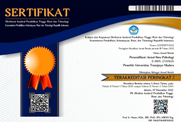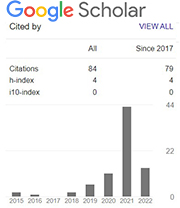Transformational Leadership dan Readiness to Change: Model Mediasi dengan Proactive Personality
Abstract
Keywords
Full Text:
PDF (Bahasa Indonesia)References
Bass, B.M. (1985). Leadership and Performance Beyond Expectation. New York: The Free Press.
Bass, B.M. (1990). From transactional to transformational leadership: learning to share vision, Organizational Dynamics, 18(3), 19-31.
Bass, BM, & Avolio, B.J. (1990), Transformational Leadership Development: Manual for the Multifactor Leadership Questionnaire. California: Consulting Psychologists Press.
Bass, Bearnard M & Ronald E Riggio. (2006). Transformational Leadership Second Edition. New Jersey: Lawrence Erlbaum Associates, Publishers.
Bateman, T. S., & Crant, J. M. (1993). The proactive component of organizational behavior: A measure and correlates. Journal of Organizational Behavior, 14(2), 103–118. doi:10.1002/job.4030140202
Bindl, U. K., & Parker, S. K. (2011). Proactive work behavior: Forward-thinking and change-oriented action in organizations. In APA handbook of industrial and organizational psychology, Vol 2: Selecting and developing members for the organization. (pp. 567-598). American Psychological Association.
Boudreau, J. W., & Ramstad, P. M. (2007). Beyond HR: The new science of human capital. Harvard Business School Press.
Buil, Isabel; Martínez, Eva; Matute, Jorge (2019). Transformational leadership and employee performance: The role of identification, engagement and proactive personality. International Journal of Hospitality Management, 77, 64–75. doi: 10.1016/j.ijhm.2018.06.014
Chaterine., Hartini, Sri., Marpaung, Winida., (2018). Readiness for Change Ditinjau dari Kepemimpinan Transformasional Pada Karyawan/I PT. Mam Medan, Jurnal Psikologi. Medan: Universitas Prima Indonesia.
Deluga, R. J. (1998). American presidential proactivity, charismatic leadership, and rated performance. The Leadership Quarterly, 9(3), 265–291. https://doi.org/10.1016/S1048-9843(98)90030-3
Foster, R. D. (2010). Resistance, Justice, and Commitment to Change. Wiley Inter Science, 21(1), 1-39.
Ghitulescu, B. E. (2013). Making Change Happen: The Impact of Work Context on Adaptive and Proactive Behaviors, The Journal of Applied Behavioral Science, 49(2), 206-245.
Gilley, & Jerry W. (2009). Organizational Change: Motivation, Communication, and Leadership Effectiveness. 75-94. Diaskes melalui (http://proquest.umi.com/pdqweb), pada tanggal 09 Oktober 2021, pukul 19.41 WIB.
Hanpachern, C., Morgan, G. A., & Griego, O. V. (2010). An extension of the theory of margin: a framework for assessing readiness for change, Human Resource Development Quarterly, 9(4), 339-350.
Holt, D. T., Armenakis, A. A., Feild, H. S., & Harris, S. G. (2007). Readiness for organizational change: The systematic development of a scale, Journal of Applied Behavioral Science, 43(2), 232–255. https://doi.org/10.1177/0021886306295295.
Iloke, Joe-Akunne, Joe-Akunne, & Ezeh. (2021). Relationship between Proactive Personality Traits and Transformational Leadership Style among Workers: Moderating Role of Psychological Empowerment, International Journal of Current Science Research and Review, 4(9),1160-1166. https://doi.org/10.47191/ijcsrr/V4-i9-12
Ming-Chu, Y., & Meng-Hsiu, L. (2015). Unlocking the black box: Exploring the link between perceive organizational support and resistance to change. Asia Pacific Management Review, 20(3), 177–183. https://doi.org/10.1016/j.apmrv.2014.10.003.
Nordin, N. (2011). The Influence of Leadership Behavior and Organizational Commitment on Organizational Readiness for Change in Higher Learning Institution, Procedia-Social and Behavioral Science, 29, 129-138.
Paren, J. (2010). Resistance to Change. Journal of Economics, 1, 1-10.
Penava, S. & Sehic, D. (2014). The relevance of transformational leadership in shaping employee attitudes towards organizational change, Economic Annals, 59, 147-150.
Regina. (2010). Pengaruh Gaya Kepemimpinan, Motivasi dan Disiplin Kerja terhadap Kinerja Karyawan (Studi pada PT Sinar Santosa Perkasa Banjarnegara (Skripsi). Universitas Diponegoro Semarang.
Robbins, P. Stephen. (2006). Perilaku Organisasi. Edisi Sepuluh. Diterjemahkan oleh: Drs. Benyamin Molan. Erlangga, Jakarta.
Robbins, Stephen P., & Judge, T.A. (2017). Perilaku Organisasi. Jakarta: Salemba Empat.
Rudolph, C. W., Lavigne, K. N., & Zacher, H. (2017). Career adaptability: A meta-analysis of relationships with measures of adaptivity, adapting responses, and adaptation results. Journal of Vocational Behavior. 98, 17–34. https://doi.org/https://doi.org/10.1016/j.jvb.2016.09.002
Sawitri, H.S., & Wahyuni, S. (2018). Readiness to Change in the Public Sector. International Journal of Business and Society, 19, 259.
Susanto, A. B. (2008). Organizational Readiness for Change: A Case Study on Change Readiness in a Manufacturing Company in Indonesia. International Journal of Man agement Perspectives, 50-61. Https://www.researchgate.net/publication/242720970.
Tampubolon, M. P. (2020). Change Management: Manajemen Perubahan : Individu, Tim Kerja, Organisasi. Jakarta: Mitra Wacana Media.
Thoha, Miftah. (2004). Kepemimpinan dalam Manajemen. Jakarta: PT. Raja Grafindo Persada.
Vermooten, N., Boonzaier, B., & Kidd, M. (2019). Job crafting, proactive personality and meaningful work: Implications for employee engagement and turnover intention. SA Journal of Industrial Psychology, 45.
Weeks, W. A., Robert, J., Chonko, L. B., & Jones, E. (2004). Organizationalreadiness for change, individual fear of change, and sales manager performance: an empirical investigation. The Journal of Personal Selling and Sales Management, 24 (1), 7-17. Http://doi/org/10.1080/08853134.2004.10749012.
Yavuz, Elçi & Uçar. (2019). Relationship Between Proactive Personality and Transformational Leadership, Mediation Effect of Psychological Ownership, The European Proceeding of Social and Behavioural Sciences, https://dx.doi.org/10.15405/epsbs.2019.01.02.53
Zhang, Z., Wang, M., & Shi, J. (2012). Leader-Follower Congruence in Proactive Personality and Work Outcomes: The Mediating Role of Leader-Member Exchange. Academy of Management Journal, 55(1), 111–130. doi:10.5465/amj.2009.086
DOI: https://doi.org/10.21107/personifikasi.v14i1.19056
Refbacks
- There are currently no refbacks.
Copyright (c) 2023 Diva Marsheilla Zaura, Missiliana Riasnugrahani

This work is licensed under a Creative Commons Attribution 4.0 International License.


Personifikasi by Universitas Trunojoyo Madura is licensed under a Creative Commons Attribution 4.0 International License.










